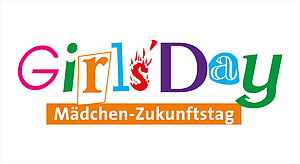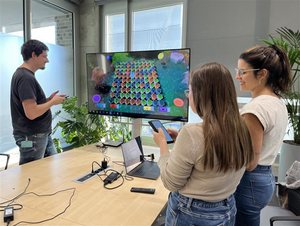Girls'Day 2025
APR 2025
03
Berlin, Germany

For the nationwide Girls' Day on April 3, 2025, the Fraunhofer Heinrich-Hertz-Institut (HHI) invites schoolgirls to experience a day in the working life of our researchers. This career orientation project aims to spark girls' interest in STEM subjects and related careers from an early age.
In nine different workshops, participants will be able to explore each department's work. During the lunch break, they can gain insights into our latest technologies and ask selected scientists about their work and research.
This event will be conducted in German.
Mega World: Data Transmission via Light and Encrypted Communication
Discover the fascinating world of light and how LiFi technology enables fast and secure data transmission using light signals. In our workshop, you will build your own LiFi receiver and decode an encrypted message. Explore the cutting-edge technologies shaping the internet of tomorrow!
The Mega World workshop is offered by the Photonic Networks and Systems.
Micro World: Insight into the Production of Tiny Optical Chips
Would you like to create your own bookmark or keychain with a custom image? In the Micro World workshop, you will gain insight into the production of tiny optical chips used in medicine, communications engineering, and more. Using your bookmark or keychain as an example, we will recreate the chip manufacturing process together.
So, put on your gloves and lab coat and head to the Photonic Components department!
Giga World: Full Insight with the Terahertz Laser
Have you ever wondered what a naked scanner sounds like? Or what the inside of a memory card looks like? Join the Giga World workshop with the Terahertz Group to explore how terahertz technology allows us to see through plastic and fabric.
The Terahertz Group is part of the Photonic Components department.
Visual World: Experience Virtual Reality with VR Glasses
How do humans see in 3D, and how do computers replicate this principle? In the Visual World workshop, hosted by the Vision and Imaging Technologies department, you will learn how digital images can be transformed into 3D videos. Using VR glasses, you will step into a virtual world and interact with real people as 3D avatars.
Video World: Talking to an Avatar
Studying from home, streaming a series while texting a friend—how does the internet handle such a massive flow of video data? In Video World, you'll get an inside look at video streaming technologies and discover the tricks platforms like Netflix, TikTok, and Twitch use to deliver videos to your smartphone. Experiment with future video formats, experience 360° video, and interact with virtual objects and people in our Video Communication and Applications department.
AI World: How Does AI Work – and Can It Be Fair?

Step into the fascinating world of artificial intelligence! In this workshop from the Artificial Intelligence department, you will learn how AI works, its strengths and limitations, and why it can sometimes be biased. You will train your own AI model, explore various AI tools, and discover how AI can be made explainable and fair. Together, we will uncover the technology behind AI and its impact on our world.
Wireless World: Obstacle Course with Robot Dogs

At the Wireless World workshop, hosted by the Wireless Communication and Networks department, you'll have the chance to interact with robot dogs and build a small electronic circuit. Learn how circuits are controlled by code and how electronic components work together. By the end, you'll have created a working circuit to take home!
Interactive World: Getting Creative with AI and Smart Systems
Explore the intersection of AI and digital creativity! In this workshop, offered by the Vision and Imaging Technologies department, you will discover how smart systems process speech and how 3D models are created from simple ideas. Additionally, we will explore immersive and interactive technologies up close in our TiME Lab.
Sensor World (for students in grade 7 and above)
How does a scanning electron microscope work? How can sensors be built using glass fibers? And how can laser light modify materials? In the Sensor World workshop, hosted by the Fiber Optic Sensor Systems department, you will work with fiber optic sensors, examine tiny objects at the nano level, and create laser engravings. For an extra challenge, try bringing water to a boil by pedaling on our experimental course!







